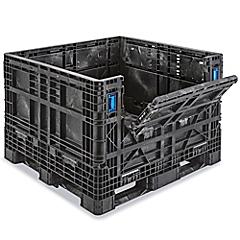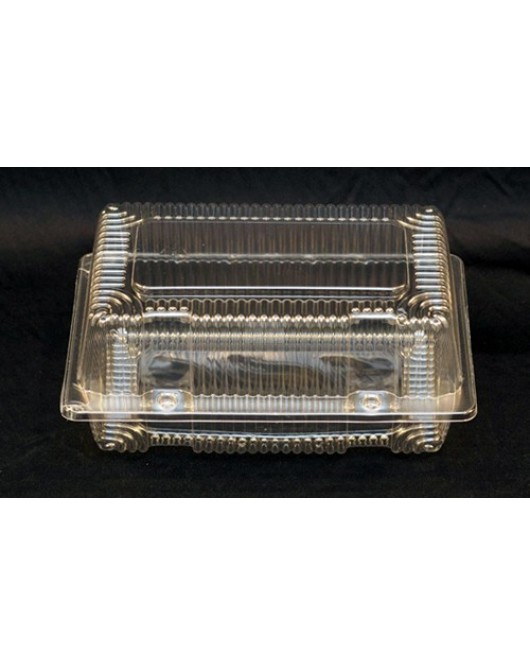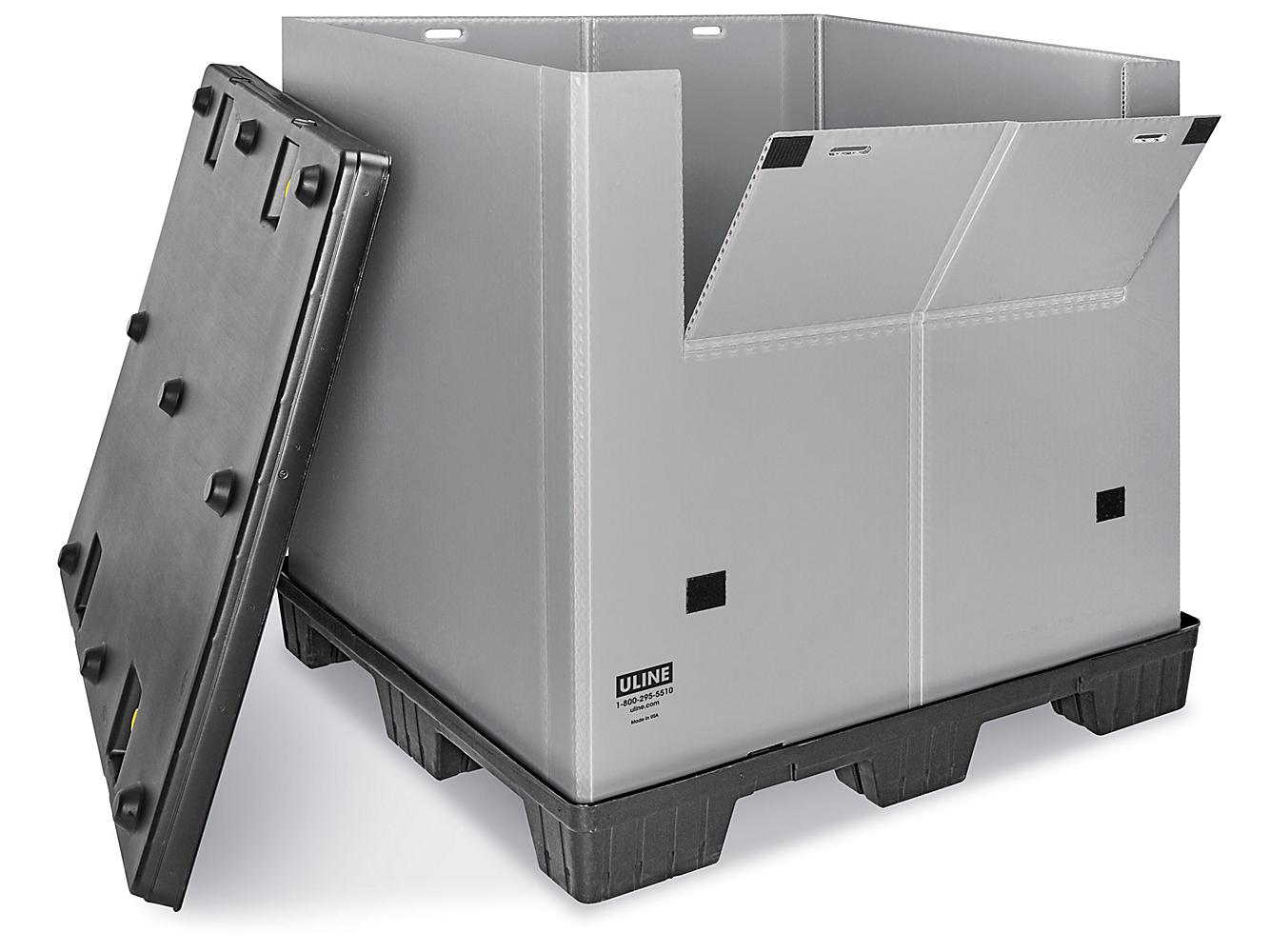A Comprehensive Overview to the Different Types of Mass Plastic Containers Available Today
Bulk plastic containers play an essential role in numerous sectors, offering solutions for storage space and transport. Their varied kinds accommodate different demands, from stiff choices for solid materials to flexible containers suiting different shapes. Each type presents distinct advantages, making it necessary to understand their applications and functions. As industries progress, so do the needs for efficient container remedies. What aspects should one think about when choosing the right mass container?
Summary of Bulk Plastic Containers

Types of Bulk Plastic Containers
Mass plastic containers been available in various types, each suited to details applications. Rigid bulk containers, adaptable mass containers, and intermediate bulk containers stand for the primary classifications, each offering one-of-a-kind benefits. Comprehending these types is crucial for choosing the right container for carrying and storing products.

Inflexible Mass Containers
Stiff mass containers are important for reliable storage and transport of various products throughout sectors. These containers are typically built from long lasting plastics, allowing them to withstand extreme handling and environmental conditions. They can be found in various shapes and dimensions, consisting of containers, totes, and drums, making them appropriate for storing every little thing from granular substances to liquids. Stiff containers often feature enhanced wall surfaces and protected covers, ensuring the contents stay shielded during transportation. Their stackable style makes the most of storage area, making them ideal for warehouses and producing centers. Furthermore, many rigid mass containers are recyclable and recyclable, adding to sustainability initiatives. On the whole, their robustness and flexibility make rigid mass containers an essential element in supply chain procedures.
Adaptable Mass Containers
Versatile bulk containers, often described as adaptable intermediate mass containers (FIBCs), act as a flexible service for storing a selection and transferring of dry products. These containers are usually made from woven polypropylene and are created to be lightweight yet solid, permitting effective handling and stacking. Their versatility enables them to fit different forms and sizes, making them suitable for products ranging from grains to chemicals. FIBCs can be geared up with attributes such as spouts for simple filling and discharge, along with safety coverings for boosted resilience. Furthermore, they are recyclable and multiple-use, adding to lasting methods in industries such as agriculture, food handling, and construction. Generally, versatile mass containers supply a economical and efficient choice for bulk material monitoring.
Intermediate Bulk Containers
Intermediate bulk containers (IBCs) are vital for the reliable transport and storage space of liquids and granular products throughout numerous markets. These containers usually have a capability varying from 275 to 330 gallons and are made for simple stacking and managing. Made from durable materials like high-density polyethylene or steel, IBCs give exceptional protection against contamination and environmental variables. Their style includes features such as an integrated pallet for forklift gain access to and a removable top for very easy filling and cleansing. IBCs are extensively used in chemical, food, and pharmaceutical sectors, guaranteeing compliance with safety laws. Their convenience and reusability make them a cost-efficient solution for bulk storage space and transport, adding to supply chain efficiency and sustainability.
Features and Advantages of Mass Plastic Containers
Bulk plastic containers are important tools in numerous markets, offering a combination of longevity and usefulness. These containers are created from high-grade products, making them immune to influences, chemicals, and ecological variables. This toughness warranties item security throughout storage and transport.
In addition, bulk plastic containers are light-weight, assisting in convenience of minimizing and handling shipping prices. Their stackable style maximizes storage efficiency, permitting for maximized stockroom space. Many models include secure lids or closures, providing a closed seal that maintains materials and stops contamination.
Furthermore, bulk plastic containers are typically reusable and recyclable, adding to sustainable practices. Their adaptability permits a wide variety of applications, from food storage to commercial use, boosting their worth throughout industries. Businesses take advantage of the lengthy life-span and low maintenance needs of these containers, making them a cost-effective option for both short-term and lasting requirements.
Industries That Utilize Bulk Plastic Containers
Various industries take advantage of making use of bulk plastic containers, each leveraging their distinct residential properties for certain applications. The food and drink market depends on these containers for secure storage and transport of products, while the chemical production field utilizes them for handling harmful materials. In addition, the pharmaceutical distribution requires highlight the importance of resilience and cleanliness in packaging remedies.
Food and Beverage Sector
As the need for risk-free and efficient storage space solutions continues to increase, the food and beverage market increasingly counts on bulk plastic containers for their operational needs. These containers offer robust, light-weight, and flexible alternatives for storing components, completed products, and waste products. Made from food-grade materials, they assure compliance with health and wellness standards. Numerous designs, such as stackable containers and lug boxes, enhance area throughout transportation and storage space, boosting logistical efficiency. Additionally, the openness of some bulk containers permits for simple supply monitoring, reducing the threat of wasting. With the industry's emphasis on sustainability, lots of suppliers are currently providing reusable and recyclable choices, lining up with environment-friendly techniques while meeting the high demands of food safety and hygiene.
Chemical Production Market
The chemical production industry counts greatly on bulk plastic containers for the safe and reliable storage read this of resources, intermediates, and completed products. These containers are created to endure various chemicals, making certain that hazardous products do not leak or deteriorate the container itself. Typical types include high-density polyethylene (HDPE) and polypropylene containers, which supply excellent chemical resistance and longevity. Their lightweight nature and stackable design facilitate transport and storage space, optimizing area in producing facilities. In addition, lots of mass plastic containers include features such as tamper-evident seals and easy-to-read labeling, improving safety and conformity with industry guidelines. Overall, mass plastic containers are essential to the chemical manufacturing procedure, supplying trusted options for dealing with varied materials.
Drug Distribution Needs
Drug circulation depends on bulk plastic containers to fulfill rigorous safety and regulatory demands. These containers are crucial for transporting and keeping a selection of pharmaceutical products, including active pharmaceutical components (APIs) and completed drugs. Their layout assurances protection versus moisture, light, and contamination, keeping the integrity of delicate products. In addition, bulk plastic containers are compliant with market criteria such as Good Production Practices (GMP) and are commonly made from materials that are FDA-approved. Making use of these containers boosts efficiency in the supply chain, enabling risk-free, massive circulation while lessening waste. Firms in the pharmaceutical industry prioritize using resilient, leak-proof, and tamper-evident containers to assure product security and top quality throughout the logistics procedure.
Factors to consider for Picking the Right Container
When choosing the proper mass plastic container, different aspects need to be very carefully evaluated to assure perfect functionality and safety and security. The nature of the products to be stored is vital; compatibility weblink with the container's product can affect honesty and security. plastic bulk containers. Additionally, the container's dimension and form should align with the storage and transport requirements, assuring efficient area use
Lots capacity is another crucial factor to consider, as it should suit the weight of materials without threat of damage or failure. The design features, such as venting or lids, can influence functionality and gain access to. Conformity with industry policies is crucial, especially in sectors like drugs, where safety standards are rigorous.
Finally, the expected lifespan and longevity of the container should be analyzed to confirm it satisfies the operational requirements without regular substitute. By reviewing these elements, one can select one of the most ideal bulk plastic container for details applications.
Ecological Influence and Sustainability
As services progressively prioritize sustainability, the ecological influence of mass plastic containers has come under examination. These containers, frequently made from materials such as polyethylene or polypropylene, add substantially to plastic waste otherwise handled properly. Their manufacturing involves the usage of fossil gas, which can result in increased greenhouse gas emissions. Developments in recycling technology and the development of eco-friendly options are helping to minimize these issues.
Moreover, many suppliers are adopting techniques that emphasize making use of recycled products, thereby lowering the need for virgin plastics. The resilience of mass plastic containers likewise plays a duty; they are made to be recycled numerous times, which can lessen their general ecological footprint when contrasted to single-use alternatives. Eventually, the industry deals with the difficulty of stabilizing capability with environmental duty, making lasting practices vital for the future of mass plastic containers.
Best Practices for Storage Space and Transport
Efficient storage space and transport of bulk plastic containers considerably influence both functional performance and sustainability. To make best use of area, companies need to stack containers safely, assuring security and stopping damages. Appropriate labeling is vital for easy identification, which streamlines retrieval processes. Furthermore, maintaining a orderly and tidy storage space location minimizes the threat of contamination and improves safety.
For transport, choosing the appropriate vehicle is vital; containers must be secured to stay clear of shifting during transportation. Business need to additionally think about using pallets to assist in less complicated loading and discharging. Regular examinations of containers for damage can stop pricey substitutes.
Temperature control is an additional essential facet, as severe conditions can jeopardize the integrity of the plastic. Training workers on finest practices for handling and transport guarantees compliance and promotes a culture of security. By executing these finest methods, companies can boost their operational performance while adding to environmental sustainability.
Often Asked Questions
Exactly how Do I Tidy Mass Plastic Containers Successfully?
To clean mass plastic containers properly, one should wash them with warm water, utilize a mild cleaning agent and scrub with a soft brush. Rinse completely, after that enable to air completely dry entirely before storage space or reuse.
What Is the Life-span of Mass Plastic Containers?
The lifespan of mass plastic containers commonly ranges from 5 to ten years, depending on the material, usage, and ecological problems. Proper maintenance and storage can greatly expand their functionality and toughness over time.
Can Mass Plastic Containers Be Custom-made?

Do Mass Plastic Containers Have Service Warranty Options?

Are There Rules for Utilizing Bulk Plastic Containers?
Yes, regulations exist for making use of bulk plastic containers, mainly concentrated on security, environmental effect, and product conformity. These laws ensure that containers satisfy industry criteria and appropriate for transferring different substances securely and successfully.
Stiff mass containers, adaptable mass containers, and intermediate mass containers stand for the key categories, each offering distinct advantages. Adaptable mass more information containers, often referred to as flexible intermediate mass containers (FIBCs), serve as a functional remedy for saving a range and delivering of completely dry products. The chemical production market relies greatly on bulk plastic containers for the secure and effective storage of raw materials, intermediates, and ended up products. Bulk Plastic Containers. These containers are developed to endure different chemicals, making sure that unsafe products do not leak or break down the container itself. Additionally, bulk plastic containers are certified with market standards such as Great Production Practices (GMP) and are often made from products that are FDA-approved